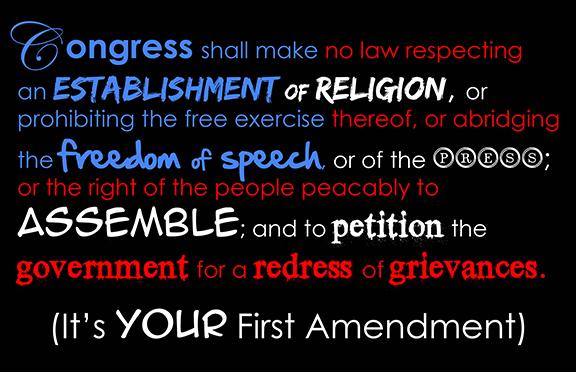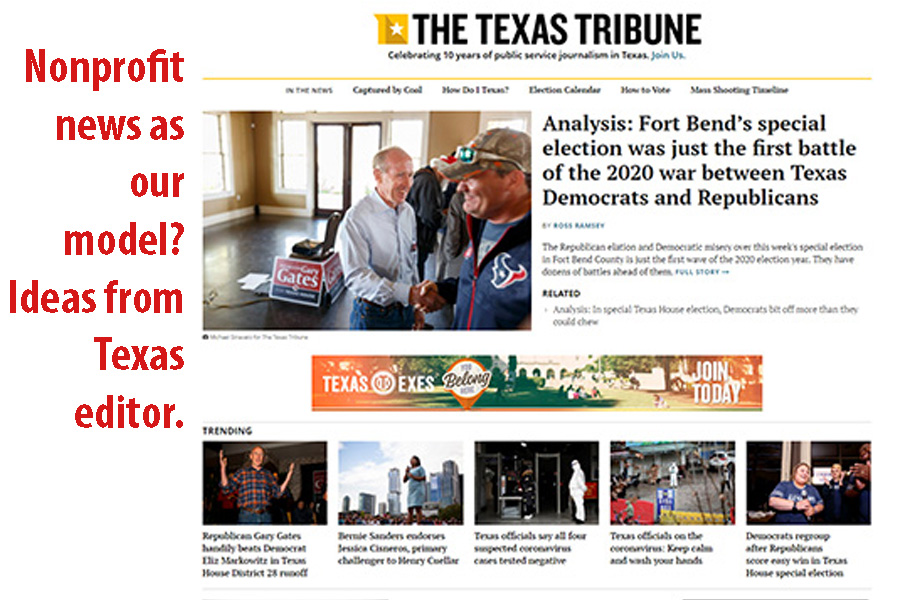
By Margaret Sullivan
Media Columnist / November 13 / The Washington Post
What really makes America great?
It’s the meaning of 45 words found in the Bill of Rights. Here they are, the entire First Amendment: “Congress shall make no law respecting an establishment of religion, or prohibiting the free exercise thereof; or abridging the freedom of speech, or of the press; or the right of the people peaceably to assemble, and to petition the government for a redress of grievances.”
Everything we have — everything that makes us unlike any other nation — flows from those words and the protections they offer for free expression.
Donald Trump’s presidency is very likely to threaten those First Amendment rights.
It is difficult to find articles from mainstream media defending President-Elect Donald Trump’s threats against the First Amendment. We encourage you to send links to such articles, and we will add them to our resources.
If they are damaged or removed, we’ll be like a lot of unenviable places.
“Freedom of speech is a rare thing, after all. It’s one of the big differences between the United States and a place like Cuba,” wrote John Daniel Davidson last March in the Federalist. “Cuba has no freedom of the press — or rule of law. Libel is whatever the regime says it is.”
These are rights that allow us to march in the streets, to worship freely, to publish tough stories about the government.
First Amendment rights are not just for journalists but for everyone — they are so core to our democracy, so much a part of everyday America, that we take them for granted.
Trump has made it clear that he has no intention of protecting or defending those rights. He has said repeatedly that he wants to change the laws that allow the press to publish news — however imperfectly — without fear of punishment.
He has called journalists “scum” and encouraged his followers to abuse and hate them. He would like to see his political opponent locked up.
Nothing but campaign rhetoric? Clean slate time? No way.
“Believe the autocrat,” Masha Gessen, a Moscow-born journalist, wrote last week in the New York Review of Books. Americans should not depend on their institutions to protect them — they crumble fast: “The national press is likely to be among the first institutional victims of Trumpism.”
It’s already happening. Trump barred reporters from his first official act as president-elect — his visit to the White House. Then, in a tweet, he blamed the media for “inciting” street protests, when there was no evidence of that.
Meanwhile, Corey Lewandowski, who carried out Trump’s press blacklist and reportedly roughed up a female reporter, was preparing for a possible role in the Trump administration. And Steve Bannon, chairman of the alt-right Breitbart News, was named chief strategist on Sunday.
“We’re facing a moment that threatens equal protection, due process, free expression, democracy — not just press freedom,” wrote Brian Beutler in the New Republic. “It’s not a drill.”
What can positive action look like? The American Civil Liberties Union moved quickly to dominate its website with a Trump photo and the words “See you in court,” with a prominent “donate” widget.
Others urged an intensive awareness campaign for citizens.
“Our only hope is to devote our efforts to educating the public as to why independent press coverage is important to them (not us),” said Mickey Osterreicher, a lawyer who represents the National Press Photographers Association.
Americans should be confronted, he said, with whether they “really want a state-controlled Ministry of Information under the thinly veiled guise of a Pravda-like press.”
Indeed, in countries where the government controls the press, and which lack other speech protections, journalists are jailed, even killed, as they try to do their work. Citizens are afraid to express their views publicly or to assemble. Until now, the United States has been a beacon for them.
“The voice, power and influence of the United States has been a boon to the men and women reporting from the front lines of wars and the back streets of autocracies,” wrote Alex Howard of the Sunlight Foundation, a free-speech organization.
Isn’t it pointless to fight back? Antonio Gramsci, the Italian political writer jailed by Mussolini’s Fascist regime, believed in “pessimism of the intellect and optimism of the will.” In other words, you can know your clapboard house is on fire, and you’re a long way from civilization. But you have to call 911, get out your garden hose and bucket, and keep acting as if the firetrucks are on the way.
Although things didn’t work out too well for Gramsci, who died at 46 shortly after he was released from prison, his formula offers a path forward. Look the situation in the eye; know how bad it is. That’s the pessimism of the intellect.
As for the optimism-of-the-will part? For journalists, it’s writing and reporting aggressively and fearlessly, and being willing to fight for access. For citizens, it’s being well-informed, including subscribing to newspapers and supporting the best journalism. It’s helping to debunk and call out fake news. It’s donating to, or getting involved with, civil rights and media rights organizations. And it’s backing public officials committed to protecting free expression.
Americans certainly shouldn’t move to Canada, but they should heed the words of the Canadian songwriter Joni Mitchell: “Don’t it always seem to go, that you don’t know what you’ve got till it’s gone?”
We’ve still got our precious First Amendment rights. Now it’s time — high time — to protect them from the fire.





